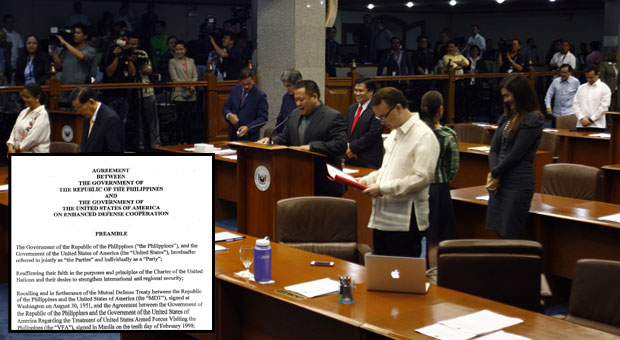
When they reconvene next week, senators will attempt to determine if the 10-year Enhanced Defense Cooperation Agreement between the Philippines and the United States requires the concurrence of the Senate—the nation’s treaty-ratifying body. INQUIRER FILE PHOTO
MANILA, Philippines—When they reconvene next week, senators will attempt to determine if the 10-year Enhanced Defense Cooperation Agreement (Edca) between the Philippines and the United States requires the concurrence of the Senate—the nation’s treaty-ratifying body.
The senators said they expected the deal, signed on Monday hours before the arrival of US President Barack Obama for a two-day state visit, to top the agenda of any caucus once Congress resumes its sessions on Monday.
Majority Leader Alan Peter Cayetano said he would seek a consensus on the agreement that grants the United States “unimpeded,” rent-free access to certain areas in Philippine military bases two decades after the shutdown of Clark Air Base and Subic Bay Naval Base—Washington’s largest overseas military facilities.
“Of course the allies of the President would want it to be part of the VFA (Visiting Forces Agreement), so there’s no need for the Senate to concur. But traditionally, the Senate wants to uphold its power and will insist that it exercise its sovereign power,” Cayetano said by phone.
He believed that the Edca constitutes a treaty requiring Senate ratification. He said the terms of the Edca indicated that the United States would enjoy the same if not more privileges than it did in the previous military bases agreement, which the Philippine Senate refused to renew in 1991 after more than half a century.
“At the very minimum, every single letter and punctuation mark should be scrutinized by the Senate. Better if the Senate has a consensus if it’s treaty and should be submitted for approval,” Cayetano said.
Sen. Miriam Defensor-Santiago, chair of the Senate foreign relations committee who twitted President Aquino and Obama for lack of good faith by letting their subalterns sign it last Monday, has asserted this should be first submitted to the Senate.
Sen. Antonio Trillanes IV, chair of the defense committee, disagrees. Even so, Trillanes said Thursday he would call an executive session of his panel so “pertinent matters” could be clarified with the Filipino officials who negotiated the deal.
“I’m convinced it is not a treaty but I’m also not stopping my fellow senators, if they feel otherwise, from raising the issue to the Supreme Court,” he said in a text message.
Cayetano said he would want to compare the terms of the Edca with those of a previous bases agreement with American troops, or with those of US agreements with other countries.
“Personally, I think they’re getting more … By doing it this way—they can build facilities, they can go in and out, etc.—I think it’s even better for them now,” he said. “If they’re going to get the same use and benefits, why should one be considered a treaty, and this one should not?”
“I don’t blame the Americans for getting a good deal,” he added.
Senate President Pro Tempore Ralph Recto said he expected a caucus on the agreement as well as other priority measures once the senators return to work on Monday.
“We will discuss it during the caucus. I’m sure everyone has read it by now,” he said.
Sen. Paolo Benigno Aquino IV is also deferring to the Supreme Court to rule on whether the deal is an implementing agreement or a separate treaty.
“If found to be at the level of a separate treaty from the MDT (Mutual Defense Treaty) I am confident that the Senate can ably fulfill its role of deliberating on the merits of the Edca and ensure that it indeed benefits the Filipino people,” he said.
But if found to be an implementing agreement of a previous treaty, the Senate could still exercise oversight function and ensure that it is implemented in compliance with the Constitution, he said.
Several members of the House of Representatives say they will question in the Supreme Court the constitutionality of the agreement hammered out as the Philippines faces an increasingly hostile China in territorial disputes in the South China Sea.
RELATED STORIES
Makabayan bloc wants House to probe defense cooperation agreement
Senate ready to hold hearings on EDCA
Not quite a base, but US has full access to AFP camps